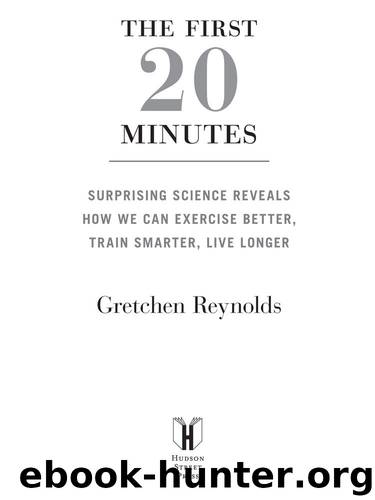The First 20 Minutes: Surprising Science Reveals How We Can: Exercise Better, Train Smarter, Live Longer by Gretchen Reynolds

Author:Gretchen Reynolds [Reynolds, Gretchen]
Language: eng
Format: mobi, epub
Publisher: Penguin Group
Published: 2012-04-26T04:00:00+00:00
Words of Power
In an edifying if simple experiment, a group of dedicated recreational runners were taught to weight train. Until then, the volunteers had just been running to prepare themselves for local races. The study took place in Finland, but it has universality. Its subjects were typical of middle-of-the-pack 5K or 10K racers anywhere.
The runners were divided into three groups. One continued to train as they had, with running alone, although each volunteer’s mileage steadily was increased. Another group was set up in the gym with trainers and shown how to traditionally lift weights. They completed a routine consisting of upper- and lower-body exercises with machines and free weights, the resistance or amount of weight that they were lifting growing progressively. And the last group underwent explosive power training.
In physiological and practical terms, strength and power are not precisely the same. Strength means how much force your muscles can produce. Power is the ability to channel that force quickly. If strength is about moving weight through space, power is about moving that weight fast, even explosively.
Traditional strength training, using weight machines or barbells and other free weights (so-called because they are not tethered to machines), builds mostly muscular strength, although it can increase power somewhat. In the Finnish study, the runners who practiced traditional weight lifting for eight weeks improved their leg strength and, presumably as a result, their maximal running speed during a timed sprint. They also performed better overall during a treadmill run than the group that had not strength trained.
But the third group, which had practiced explosive power training by jumping onto and off of boxes and lifting light free weights over and over at a faster pace than the traditional strength trainers, also outperformed the running-only group on the treadmill, and had a notable kick during the sprint testing.
Strength training and power training, the authors concluded, were “effective in improving treadmill running performance.”
Multiple other studies have produced similar results. There seem to be few if any downsides to weight training for endurance athletes and many advantages, chiefly that the training seems to make people faster. In another representative study of traditional, machine-based weight training involving both the upper body—gangling in many runners—and the legs, a group of experienced runners became physiologically more efficient. They used less oxygen to cover the same mileage as they had before they began resistance work. And their late-stage sprinting ability soared.
Other studies have found particular benefits for endurance athletes, such as runners, from more idiosyncratic explosive-power training, namely plyometrics. With plyometrics, you leap from the ground onto boxes and otherwise overload your muscles using body weight and sudden acceleration and deceleration in space. In a recent study involving competitive male distance runners, half added a weekly session of standard machine-based strength training to their ongoing running training. Another added a once-a-week session of plyometrics. After eight weeks, both groups had improved their running efficiency, but the runners practicing plyometrics had improved more.
Several small studies since of both male and female runners, experienced and novice, have produced similar results.
Download
The First 20 Minutes: Surprising Science Reveals How We Can: Exercise Better, Train Smarter, Live Longer by Gretchen Reynolds.epub
This site does not store any files on its server. We only index and link to content provided by other sites. Please contact the content providers to delete copyright contents if any and email us, we'll remove relevant links or contents immediately.
Periodization Training for Sports by Tudor Bompa(8253)
Bodyweight Strength Training by Jay Cardiello(7908)
Born to Run: by Christopher McDougall(7120)
Inner Engineering: A Yogi's Guide to Joy by Sadhguru(6785)
Asking the Right Questions: A Guide to Critical Thinking by M. Neil Browne & Stuart M. Keeley(5757)
The Fat Loss Plan by Joe Wicks(4907)
Bodyweight Strength Training Anatomy by Bret Contreras(4677)
Yoga Anatomy by Kaminoff Leslie(4358)
Dynamic Alignment Through Imagery by Eric Franklin(4208)
Science and Development of Muscle Hypertrophy by Brad Schoenfeld(4127)
Exercise Technique Manual for Resistance Training by National Strength & Conditioning Association(4061)
ACSM's Complete Guide to Fitness & Health by ACSM(4057)
The Four-Pack Revolution by Chael Sonnen & Ryan Parsons(3973)
Bodyweight Strength Training: 12 Weeks to Build Muscle and Burn Fat by Jay Cardiello(3961)
The Ultimate Bodybuilding Cookbook by Kendall Lou Schmidt(3935)
Yoga Anatomy by Leslie Kaminoff & Amy Matthews(3900)
American Kingpin by Nick Bilton(3875)
Nutrition for Sport, Exercise, and Health by Spano Marie & Kruskall Laura & Thomas D. Travis(3774)
Yoga Therapy by Mark Stephens(3742)
